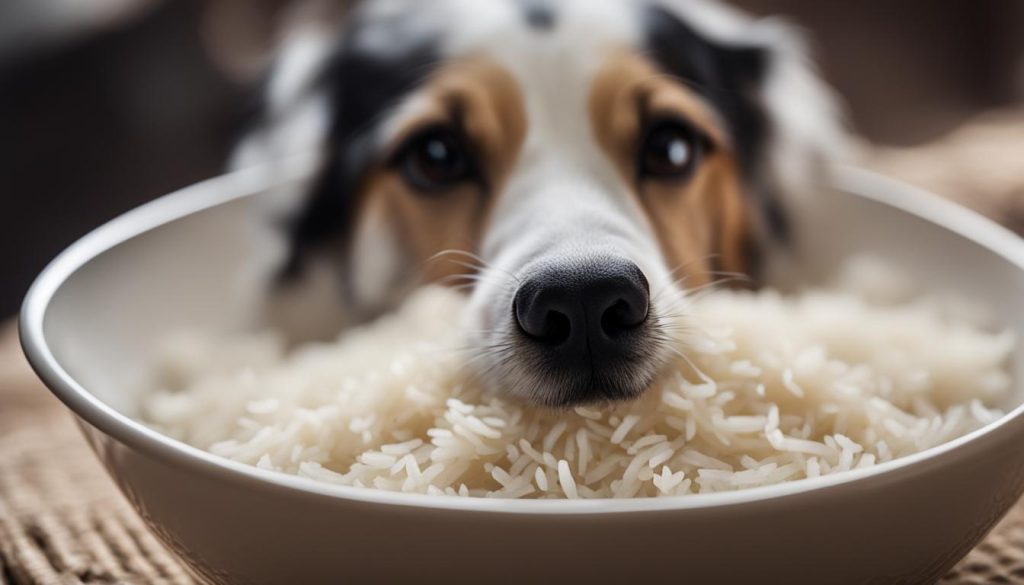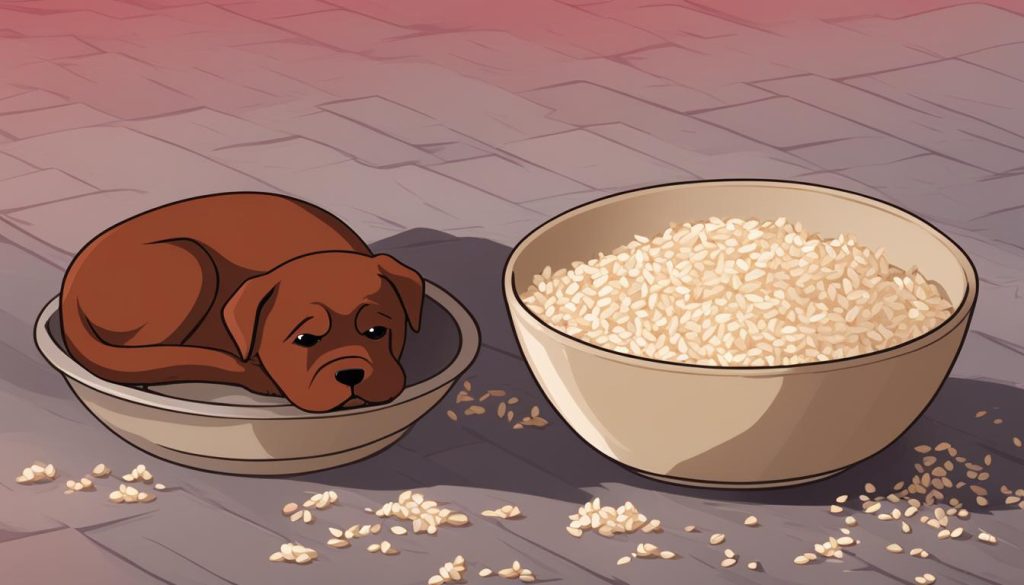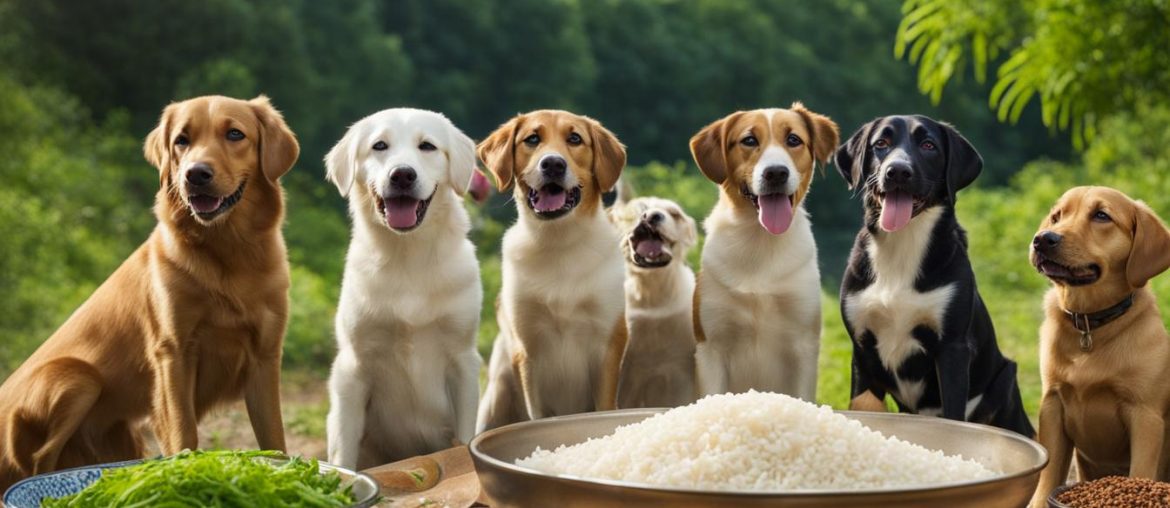As a dog owner, you may wonder if it’s safe to include basmati rice in your furry friend’s diet. Rice is a common ingredient in commercial dog foods and is often recommended for dogs with gastrointestinal issues due to its digestibility and low fiber content. However, when it comes to feeding basmati rice to dogs, there are some important considerations to keep in mind.
White rice is the preferred choice for dogs with sensitive stomachs, as it is easily digestible. Brown rice, on the other hand, can be harder for dogs to digest and may not be suitable for those with gastrointestinal issues. It’s also important to note that while rice can be a part of a healthy dog diet, it should be fed in moderation, especially for diabetic dogs due to its higher glycemic index.
If you’re thinking of introducing basmati rice to your dog’s diet, it’s crucial to consult with your veterinarian first. They can provide personalized guidance based on your dog’s specific needs and health conditions. Remember, any dietary changes should be made under professional guidance to ensure your dog’s well-being.
Key Takeaways:
- Rice is safe and commonly included in commercial dog foods.
- White rice is preferred for dogs with gastrointestinal issues, while brown rice may be harder to digest.
- Basmati rice can be fed to dogs in moderation.
- Always consult with your veterinarian before introducing new foods to your dog’s diet.
- Rice should only make up a small portion of your dog’s overall diet.
Is Rice Good for Dogs?

Rice is considered safe and healthy for dogs to eat. It provides carbohydrates, which are an important part of a dog’s diet, along with essential vitamins and minerals such as magnesium, phosphorus, manganese, selenium, iron, and B vitamins. White rice is often recommended for dogs with digestive problems, as it is bland and easily digestible. Brown rice, while nutritious, is not usually recommended for dogs with gastrointestinal issues. Basmati rice, a type of long-grain white rice, can be fed to dogs in moderation. However, it is important to note that rice should not make up a large portion of a dog’s diet, and it is best to consult with a veterinarian before making any dietary changes.
Feeding dogs rice can offer several benefits. Rice provides a source of clean energy, promotes healthy bowel movements, and supports digestion due to its starch content. Additionally, rice is low in fats and cholesterol, making it beneficial for brain health in dogs. Certain types of rice, such as wild rice, can also provide antioxidants and fiber, contributing to overall health and well-being. However, it is crucial to feed rice in moderation and consult with a veterinarian for personalized advice based on your specific dog’s needs and health conditions.
To ensure the safe feeding of rice to your dog, it is important to follow some guidelines. Cook the rice in water without any seasonings or spices, as these can upset your dog’s stomach or be toxic to them. Start with small amounts and gradually introduce rice into your dog’s diet to ensure they tolerate it well. Rice should only make up a small portion of your dog’s overall diet, with the majority of their nutrition coming from a balanced dog food. Treats and snacks, including rice, should not make up more than 10% of your dog’s total daily food intake. Consulting with a veterinarian before introducing rice or any new food into your dog’s diet is always recommended for the health and well-being of your furry friend.
Rice Types Suitable for Dogs
| Rice Type | Suitability for Dogs |
|---|---|
| White Rice | Recommended for dogs with digestive problems due to its blandness and easy digestibility. |
| Brown Rice | Nutritious but may be harder to digest, not usually recommended for dogs with gastrointestinal issues. |
| Basmati Rice | Can be fed to dogs in moderation. |
| Jasmine Rice | Safe for dogs to consume. |
| Wild Rice | Provides antioxidants and fiber for dogs. |
How to Safely Feed Your Dog Rice

When it comes to feeding your dog rice, it’s important to follow a few guidelines to ensure their safety and well-being. Here are some steps you can take:
- Cook the rice in water without any seasonings or spices. Dogs have sensitive stomachs, and these additives can cause digestive upset or even be toxic to them.
- Start with small amounts and gradually introduce rice into your dog’s diet. This allows you to monitor their tolerance and make adjustments if needed.
- If you’re using rice to address gastrointestinal issues, consult your veterinarian for a specific ratio of rice to protein that is suitable for your dog’s condition.
Rice should only make up a small portion of your dog’s overall diet. The majority of their nutrition should come from a balanced dog food that meets their specific dietary needs. Treats and snacks, including rice, should not exceed 10% of your dog’s total daily food intake.
By following these guidelines, you can safely incorporate rice into your dog’s diet and provide them with a nutritious and balanced meal.
Different Types of Rice for Dogs
When it comes to feeding dogs rice, there are various types to consider. While dogs can eat brown rice, jasmine rice, and wild rice, it is important to understand the specific qualities and benefits of each variety.
Brown Rice
Brown rice is safe for dogs to eat, but it can be harder to digest compared to white rice. It is a good source of fiber and contains essential nutrients, including vitamins and minerals. However, if your dog has gastrointestinal issues, it may be best to opt for a more easily digestible rice variety.
Jasmine Rice
Jasmine rice, a type of long-grain white rice, is safe for dogs to consume. It has a fragrant aroma and a slightly sticky texture, making it appealing to both dogs and humans. Jasmine rice is a good source of carbohydrates and provides energy for your furry friend.
Wild Rice
Wild rice is often found in gourmet wet dog foods and can be a nutritious addition to your dog’s diet. It is high in fiber and antioxidants, which can support digestion and overall health. However, it should be fed in moderation and as part of a balanced diet, as too much fiber can lead to digestive upset in some dogs.
When introducing different types of rice to your dog’s diet, it is important to do so gradually and in consultation with your veterinarian. They can provide personalized recommendations based on your dog’s specific needs and health conditions. Remember, rice should only make up a small portion of your dog’s overall diet, and the majority of their nutrition should come from a complete and balanced dog food.
| Rice Variety | Suitable for Dogs? |
|---|---|
| Brown Rice | Yes, but harder to digest |
| Jasmine Rice | Yes, safe for dogs to consume |
| Wild Rice | Yes, in moderation and as part of a balanced diet |
Recommended Amount of Rice for Dogs
When it comes to feeding rice to your dog, it’s important to be mindful of the recommended amount. While rice can be a healthy addition to a dog’s diet, it should only make up a small portion of their overall food intake. Treats and snacks, including rice, should ideally make up no more than 10% of a dog’s daily diet, with the remaining 90% coming from a well-balanced dog food.
The recommended amount of rice may vary depending on the size of your dog. For example, an extra-small dog weighing 2-20 pounds can be given 1-2 tablespoons of rice, while a large dog weighing 51-90 pounds can have ⅓ cup of rice. Please be aware that these serving sizes should be adjusted based on your dog’s specific needs, activity level, and any underlying health conditions.
Consulting with a veterinarian is crucial when determining the appropriate amount of rice for your dog. They can provide personalized guidance based on your dog’s individual needs and ensure that the rice portion is suitable for their overall health and well-being.
Remember, moderation is key when it comes to feeding rice to your furry friend. Always consult with your veterinarian for accurate information and advice.
| Dog Size | Recommended Amount of Rice |
|---|---|
| Extra-Small (2-20 lbs) | 1-2 tablespoons |
| Small (21-50 lbs) | ¼ – ⅓ cup |
| Medium (51-90 lbs) | ⅓ – ½ cup |
| Large (91+ lbs) | ½ – 1 cup |
Potential Allergies to Rice in Dogs

While rice is generally safe for dogs, it is important to be aware that some dogs may have allergies to rice. Just like humans, dogs can develop sensitivities or allergies to certain foods, and rice is no exception. If your dog experiences any adverse reactions after consuming rice, such as vomiting, itchy skin, inflamed paws, dry skin, skin rash, or hair loss, it could be an indication of a rice allergy.
If you suspect that your dog may be allergic to rice, it is best to discontinue feeding rice and consult with your veterinarian. They can help determine if your dog indeed has a rice allergy or if there may be other underlying factors contributing to the symptoms. Your veterinarian may recommend allergy testing or an elimination diet to identify the specific allergen and suggest suitable alternative foods for your dog.
It is important to note that rice allergies in dogs are relatively rare. However, if your dog does have a rice allergy, it doesn’t mean they cannot have other grains in their diet. There are various alternative grains and carbohydrate sources available, such as potatoes, sweet potatoes, quinoa, or oats, which can be discussed with your veterinarian to ensure your dog’s nutritional needs are met without triggering allergic reactions.
| Symptoms of Rice Allergy in Dogs: | Possible Allergy Alternatives: |
|---|---|
| • Vomiting | • Potatoes |
| • Itchy skin | • Sweet potatoes |
| • Inflamed paws | • Quinoa |
| • Dry skin | • Oats |
| • Skin rash | |
| • Hair loss |
If you suspect your dog may have a rice allergy, it is essential to consult with your veterinarian to provide the appropriate care and dietary adjustments for your furry friend’s well-being.
Risks of Feeding Dogs Rice

While rice is generally safe for dogs to eat, it is important to be aware of the potential risks associated with feeding dogs rice. These risks include:
- Weight Gain: Excessive consumption of rice, which is high in carbohydrates, can contribute to weight gain in dogs. It is important to feed rice in moderation and ensure that it does not make up a large portion of your dog’s diet.
- High Glycemic Index: White rice, including basmati rice, has a higher glycemic index, which means it can cause a rapid rise in blood sugar levels. This can be a concern for diabetic dogs or those at risk of developing diabetes. It is crucial to consult with a veterinarian to determine the appropriate amount of rice for your dog’s specific needs.
- Allergies: While rare, some dogs may be allergic to rice. Signs of a rice allergy may include vomiting, itchy skin, inflamed paws, dry skin, skin rash, or hair loss. If you suspect your dog has a rice allergy, it is recommended to discontinue feeding rice and seek veterinary advice.
These risks highlight the importance of feeding rice to dogs in moderation and under the guidance of a veterinarian. It is crucial to consider your dog’s individual needs, health conditions, and overall dietary requirements when making decisions about their diet.
| Risks of Feeding Dogs Rice | Description |
|---|---|
| Weight Gain | Excessive consumption of rice can lead to weight gain in dogs. |
| High Glycemic Index | White rice, including basmati rice, has a high glycemic index, which can cause a rapid rise in blood sugar levels. |
| Allergies | While rare, some dogs may be allergic to rice, resulting in symptoms such as vomiting, itchy skin, and skin rash. |
Overall, rice can be a part of a healthy and balanced diet for dogs when fed in moderation and in consultation with a veterinarian. It is important to prioritize a well-balanced dog food diet that meets all of your dog’s nutritional needs and to treat rice as an occasional addition or a small portion of their overall diet.
Consulting Your Veterinarian Before Feeding Rice to Your Dog

If you’re considering adding rice to your dog’s diet, it is essential to consult with your veterinarian first. They can provide expert guidance and recommendations based on your dog’s specific needs and health conditions.
When it comes to feeding rice to dogs, there are several factors that your veterinarian will take into consideration. They will assess your dog’s overall health, any existing medical conditions, and their nutritional requirements. By consulting with your veterinarian, you can ensure that rice is a suitable addition to your dog’s diet and that it is fed in the appropriate portion sizes.
Additionally, your veterinarian can advise you on the proper way to introduce rice into your dog’s diet. They may suggest starting with small amounts and gradually increasing the portion sizes to monitor your dog’s tolerance and digestive response. Your veterinarian may also recommend specific ratios of rice to protein if you are using rice as part of a therapeutic or gastrointestinal diet for your dog.
Working with your veterinarian
Your veterinarian’s guidance is crucial in ensuring the safety and well-being of your dog. They have a comprehensive understanding of your dog’s unique health requirements and can provide the necessary insight to make informed decisions about their diet. By working closely with your veterinarian, you can address any concerns or questions you may have about feeding rice to your furry friend.
Remember, every dog is different, and what works for one dog may not work for another. Your veterinarian will provide personalized recommendations to meet your dog’s specific needs. By following their advice, you can provide your dog with a balanced and nutritious diet that includes rice in a safe and appropriate manner.
The Benefits of Including Rice in Your Dog’s Diet

When it comes to your dog’s diet, incorporating rice can offer several benefits. Rice serves as a source of clean energy for dogs, thanks to its high carbohydrate content. It provides essential carbohydrates, which are vital for fueling your dog’s daily activities and maintaining their overall energy levels. Additionally, rice can promote healthy bowel movements and aid digestion due to its starch content. It acts as a gentle source of fiber, helping to regulate your dog’s digestive system and ensure regularity.
Furthermore, rice is low in fats and cholesterol, making it a suitable option for promoting brain health in dogs. The brain relies on healthy fats for optimal function, and by including rice in your dog’s diet, you can provide them with a nutritious and brain-supportive food. Rice also contains a variety of important minerals and nutrients, such as manganese, phosphorus, magnesium, selenium, iron, and B vitamins. These nutrients contribute to your dog’s overall health and well-being, supporting various bodily functions and promoting vitality.
“Rice provides a source of clean energy for dogs, promotes healthy bowel movements, and supports brain health due to its low fat and cholesterol content.”
It is important to note that while rice offers benefits to your dog, it should be included as part of a well-balanced diet. Rice should not replace a complete and balanced dog food, which provides all the essential nutrients your dog needs. Instead, it can be included as a complementary ingredient or occasional treat. Consulting with your veterinarian is essential to ensure you are feeding rice in appropriate quantities and taking into consideration your dog’s specific dietary requirements and any underlying health conditions.
| Benefits of Including Rice in Your Dog’s Diet |
|---|
| Promotes clean energy |
| Aids digestion and bowel movements |
| Supports brain health |
| Rich in essential minerals and nutrients |
In summary, incorporating rice into your dog’s diet can provide various benefits, including clean energy, improved digestion, brain health support, and a range of essential nutrients. However, it is crucial to consult with your veterinarian to determine the appropriate amount of rice to include in your dog’s diet and to ensure overall dietary balance. Remember to prioritize a well-balanced dog food and use rice as a complementary ingredient or occasional treat for your furry friend.
Popular Questions About Feeding Dogs Rice
As dog owners, it’s natural to have questions about what we can and cannot feed our furry companions. When it comes to rice, there are a few popular questions that often arise. Let’s dive into some of these common inquiries:
1. Can dogs eat rice every day?
Dogs can eat rice as part of a balanced diet, but it’s important to feed it in moderation. While rice provides nutrients and energy, too much of it can lead to weight gain and other health issues. It’s best to consult with a veterinarian to determine the appropriate amount of rice for your dog’s specific needs.
2. Can dogs eat rice pudding?
Rice pudding is a delicious treat for humans, but it’s not recommended for dogs. Commercial rice pudding often contains ingredients like sugar, dairy, and spices, which can be harmful to dogs. Stick to plain, cooked rice without any additives when feeding rice to your furry friend.
3. Can dogs eat fried rice?
Fried rice, typically made with added ingredients like soy sauce, garlic, and onions, is not suitable for dogs. These ingredients can be toxic or cause digestive upset in dogs. It’s crucial to avoid giving your dog any fried or seasoned rice and stick to plain, cooked rice instead.
4. Can dogs eat rice cakes?
Rice cakes can be a convenient snack for humans, but they may not be the best option for dogs. Commercial rice cakes often contain added flavors, salt, or other additives that can be unhealthy for dogs. It’s always safer to stick to plain, cooked rice as a safe and nutritious option for your canine companion.
Remember, these are general guidelines, and every dog is unique. To ensure the health and well-being of your furry friend, it’s always best to consult with a veterinarian regarding any specific dietary concerns or questions you may have.
Table: Common Questions about Feeding Dogs Rice
| Question | Answer |
|---|---|
| Can dogs eat rice every day? | Dogs can eat rice as part of a balanced diet, but it should be in moderation. |
| Can dogs eat rice pudding? | Rice pudding often contains ingredients that can be harmful to dogs, so it’s best to avoid feeding it to them. |
| Can dogs eat fried rice? | Fried rice with added seasonings is not recommended for dogs as it can cause digestive upset. |
| Can dogs eat rice cakes? | Commercial rice cakes may contain unhealthy additives, so it’s safer to stick to plain, cooked rice. |
Wrapping Up
To summarize, basmati rice and other types of rice can be safely included in a dog’s diet, but it should be done in moderation. Rice provides dogs with carbohydrates, essential vitamins, and minerals that contribute to their overall health. It is commonly recommended for dogs with gastrointestinal issues due to its digestibility and low fiber content. However, it is important to note that rice should not make up a large portion of a dog’s diet.
When feeding rice to dogs, it is crucial to follow certain guidelines. Rice should be plain and cooked in water without any seasonings or spices. Introduce rice gradually into your dog’s diet to ensure they tolerate it well, especially if it is being used to address digestive problems. Additionally, always consult with a veterinarian before introducing new foods to your dog’s diet to ensure it aligns with their specific needs and health conditions.
While rice is generally safe for dogs, it is important to be aware of potential allergies and risks associated with feeding dogs rice. Some dogs may have allergies to rice, and excessive consumption of rice can contribute to weight gain. Diabetic dogs should also consume rice in moderation due to its glycemic index. Consulting with a veterinarian will help determine if rice is suitable for your dog and ensure their dietary needs are met.
Remember, feeding rice to your dog should be part of a well-balanced diet. Rice should only make up a small portion of their overall food intake, with the majority coming from a balanced dog food. By following these guidelines and seeking veterinary guidance, you can safely incorporate rice into your dog’s diet to promote their health and well-being.
FAQ
Can dogs eat basmati rice?
Yes, dogs can eat basmati rice in moderation. Basmati rice is a type of long-grain white rice that is safe for dogs to consume.
Is rice good for dogs?
Rice can be good for dogs when fed in moderation. It provides carbohydrates, essential vitamins, and minerals. However, it should not make up a large portion of a dog’s diet, and it is best to consult with a veterinarian before making any dietary changes.
How to safely feed your dog rice?
When feeding rice to your dog, it should be plain and cooked in water without any seasonings or spices. Start with small amounts and gradually introduce rice into your dog’s diet. Always consult your veterinarian before introducing new foods to your dog’s diet.
What are the different types of rice for dogs?
Dogs can eat various types of rice, including brown rice, jasmine rice, and wild rice. Brown rice is safe for dogs, but it can be harder to digest. Jasmine rice is also safe for dogs, while wild rice provides antioxidants and fiber.
What is the recommended amount of rice for dogs?
The recommended amount of rice varies depending on the size of your dog. It is best to consult with a veterinarian to determine the appropriate portion size for your dog’s specific needs and health conditions.
Can dogs be allergic to rice?
Yes, some dogs may have allergies to rice. Allergic reactions to rice in dogs can include vomiting, itchy skin, inflamed paws, dry skin, skin rash, or hair loss. If you suspect a rice allergy, consult with a veterinarian for suitable alternative foods.
What are the risks of feeding dogs rice?
Risks of feeding dogs rice include weight gain and potential blood sugar level concerns for diabetic dogs. It is important to feed rice in moderation and consult with a veterinarian for personalized advice.
Why should you consult your veterinarian before feeding rice to your dog?
Consulting a veterinarian before introducing rice or any new food into your dog’s diet is crucial. They can provide personalized guidance based on your dog’s specific needs and health conditions.
What are the benefits of including rice in your dog’s diet?
Rice provides clean energy, promotes healthy bowel movements, and supports overall health in dogs. Different types of rice can offer additional benefits such as antioxidants and fiber.
What are some popular questions about feeding dogs rice?
Some popular questions about feeding dogs rice include whether dogs can eat rice every day, rice pudding, fried rice, or rice cakes. The answers depend on the specific needs and health conditions of your dog, so it is best to consult with a veterinarian for accurate and personalized advice.






